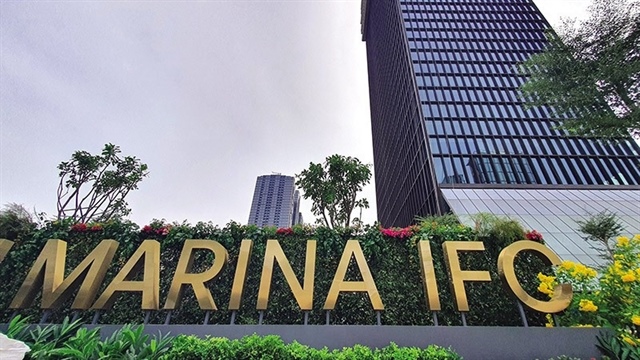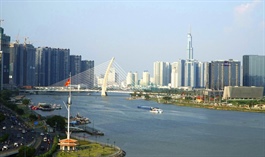International Financial Centre: A hard nut to crack for banks
International Financial Centre: A hard nut to crack for banks
The SBV’s draft decree stipulates that member banks of the IFC will not benefit from early intervention, special control measures, restructuring support, or special loans in case of distress. Instead, the resolution approach will be license revocation, dissolution, bankruptcy, and asset liquidation.

The International Financial Center serves as a free market, offering extensive business opportunities for banks. Photo baodautu.vn |
When establishing subsidiaries in Việt Nam’s International Financial Centre (IFC), domestic parent banks must accept the risk of bankruptcy if their operations prove ineffective, as they will not be eligible for early intervention, special loans, or restructuring support from the State Bank of Vietnam (SBV).
Greater freedom, but under strict supervision
According to a draft decree on licensing the establishment and operation of banks, overseas remittance management, anti-money laundering, and counter proliferation financing in the IFC, banks seeking to set up operations in this centre must meet strict conditions. A wholly domestic bank must have a minimum of total assets of VNĐ100 trillion (US$3.79 billion), a wholly foreign-owned bank at least $10 billion, and foreign bank branches at least $20 billion, in total assets.
Additionally, banks must have been profitable for the three consecutive years prior to their application, maintain a non-performing loan ratio below 3%, comply with safety ratios, and ensure effective internal control systems. Based on these criteria, set by the SBV, many major Vietnamese banks, including state-owned commercial banks and joint stock commercial banks, will be eligible to enter the centre.
Speaking to Đầu tư (Vietnam Investment Review), Dr. Nguyễn Quốc Hùng, General Secretary of the Vietnam Banks Association, said the IFC is a free market that offers significant business opportunities to banks. However, it is a “controlled freedom”. For example, money transfers abroad of $1,000 or more must be reported.
To prevent capital flows from the rest of Việt Nam into the IFC and then abroad, the draft decree prohibits members of the centre from raising capital from non-members within Việt Nam.
Associate Professor Dr. Nguyễn Hữu Huân from the University of Economics HCM City noted that such restrictions are essential to prevent capital flight and ensure monetary security.
While the entry requirements may not be overly difficult for large domestic banks, competing effectively against global players in the IFC will be no easy task. For instance, BIDV, Việt Nam’s largest bank by assets, holds only 1/60th of the assets of Canada’s CIBC and a fraction of many leading international banks.
Beyond capital limitations, Vietnamese banks lag far behind in terms of ecosystems, governance capacity, technological infrastructure, and data systems. Operating in the centre means competing under the same legal framework and environment as major international institutions.
Moreover, Vietnamese banks primarily offer traditional financial services, while the IFC is expected to host new models in Việt Nam such as gold exchanges, digital asset trading platforms, and art trading exchanges. Domestic banks will therefore need to develop innovative financial products, derivatives, creative instruments, and risk management tools to meet the diverse demands of centre customers.
Avoiding risk “spillover” to parent banks
The SBV’s draft decree stipulates that member banks of the IFC will not benefit from early intervention, special control measures, restructuring support, or special loans in case of distress. Instead, the resolution approach will involve license revocation, dissolution, bankruptcy, and asset liquidation.
Hùng stressed that domestic banks must carefully assess the capital they allocate to IFC subsidiaries to avoid impacting their parent banks. Subsidiaries operating in the centre will not receive the same “bailouts” as banks operating in the domestic market.
According to Huân, these regulations are designed to prevent the transmission of risks from IFC-based banks to domestic parent banks. Allowing bankruptcy within the centre will also serve as a policy “test case” for the SBV.
- 21:51 10/09/2025

























